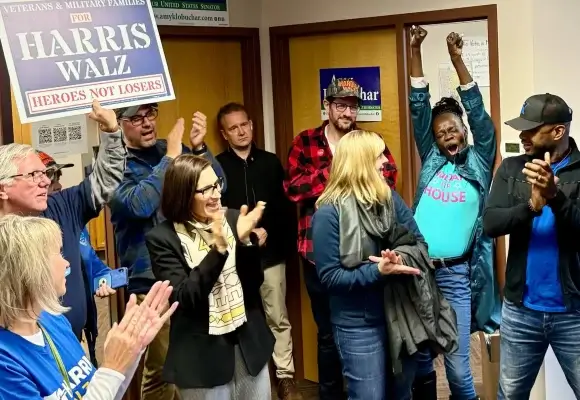|
LISTEN TO THIS THE AFRICANA VOICE ARTICLE NOW
Getting your Trinity Audio player ready...
|
Haiti’s PM Ariel Henry Resigns As Gangs Dominate
Haiti’s Prime Minister Ariel Henry Tuesday morning announced his decision to step down amidst escalating violence and political unrest. The announcement came after regional leaders convened in Jamaica to deliberate on Haiti’s political transition.
Henry, stranded in Puerto Rico due to blockades by armed gangs, revealed his resignation through a video address, appealing for calm among the Haitian populace. He committed to relinquishing his position following the establishment of a transitional council. He also thanked the Haitian people for their support during his tenure.
“The government that I am leading will resign immediately after the installation of [a transition] council,” Henry said.
“I want to thank the Haitian people for the opportunity I had been granted. I’m asking all Haitians to remain calm and do everything they can for peace and stability to come back as fast as possible.”
Henry’s leadership, which began on an interim basis in July 2021 after the assassination of President Jovenel Moïse, has been marred by delayed elections and security concerns. His extended governance without electoral mandate faced criticism, as heavily armed gangs took control of Port-au-Prince, demanding his resignation. Amid these crises, a state of emergency and extended curfew have been enforced in the capital and its environs.
The situation escalated when Henry was abroad in Kenya to finalize an agreement on deploying an international security force to combat the violence. His return was thwarted by gang-led assaults, including attacks on police stations and the liberation of inmates from major prisons, culminating in the suspension of his flight to Haiti.
Henry’s resignation had been anticipated, with Caricom, a consortium of Caribbean nations, and the White House acknowledging the necessity of his departure to facilitate a transition to a provisional governance structure. The shift in stance from Washington, influenced by the intensifying violence, showed the lack of support for Henry from both regional allies and the U.S. State Department.
In response to the unfolding crisis, U.S. Secretary of State Antony Blinken pledged an additional $100 million to support a UN-endorsed, Kenyan-led security mission in Haiti, elevating the total U.S. contribution to $300 million and allocating an additional $33 million for humanitarian assistance.
Following the discussions in Kingston, the chair of the Caricom group and President of Guyana, Irfaan Ali, acknowledged Henry’s resignation and outlined the composition and objectives of the transitional presidential council. This council, consisting of observers and voting members from diverse sectors, is tasked with appointing an interim prime minister and facilitating the country’s first elections since 2016.
Haiti, the poorest nation in the Americas, faces chronic instability exacerbated by dictatorships, natural disasters, and continuous unrest. The assassination of President Moïse in July 2021 further deepened the political vacuum, leaving the country in a state of turmoil. The establishment of a UN peacekeeping force in 2004, which withdrew in 2017, was one of many international efforts to stabilize Haiti, which continues to struggle with the repercussions of a devastating earthquake in 2010 and ongoing gang violence.
Kenya to Proceed with Haiti Mission After Council Forms
Kenya’s commitment to send police officers to Haiti, initially put on hold due to political instability in the Caribbean nation, will resume once a transitional presidential council is established, President William Ruto confirmed Wednesday.
This development follows the announcement of Haitian Prime Minister Ariel Henry’s resignation, which temporarily suspended the deployment amid concerns over the absence of a stable political administration to coordinate with.
Principal Secretary for Foreign Affairs in Kenya, Korir Sing’oei, highlighted the challenge, noting that the resignation left Haiti without the necessary framework for deploying the Kenyan police force. “There is no anchor on which the deployment can rest,” Sing’oei told the BBC.
The decision to delay was revisited following a conversation between President Ruto and US Secretary of State Antony Blinken. They discussed the “expeditious deployment” of Kenyan officers as part of a multinational effort to curb Haiti’s severe gang violence, which led to Kenya’s pledge last year to contribute approximately 1,000 police officers. Blinken assured Ruto that the transitional presidential council in Haiti, crucial for moving forward, “will be formed shortly,” as reported by State Department Spokesperson Matthew Miller.
Ruto expressed Kenya’s readiness to lead the UN Security Support Mission in Haiti, aiming to restore peace and security, pending the formation of the presidential council. He shared on social media that this leadership role would commence as soon as Haiti establishes the council through an agreed process. Nevertheless, reports from Haitian media suggest that the council’s formation may encounter delays due to opposition from some political factions.
Once in place, the council will appoint an interim prime minister and a council of ministers to govern Haiti until elections can be held. This new administration will also collaborate with the Kenyan-led international police force to tackle the rampant gang violence plaguing the country.











LEAVE A COMMENT
You must be logged in to post a comment.